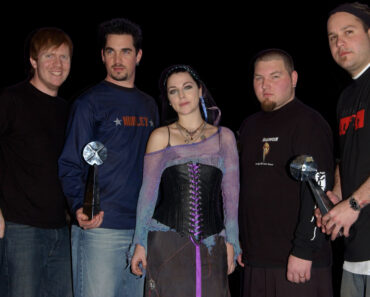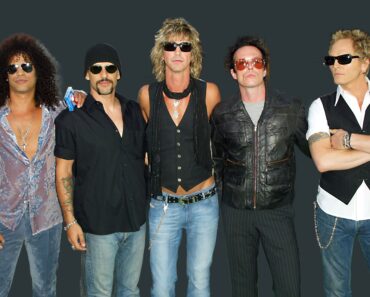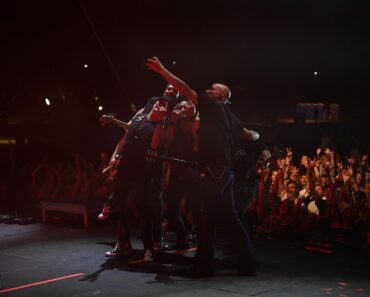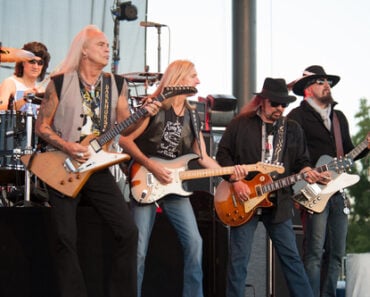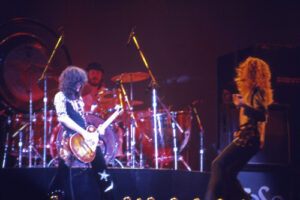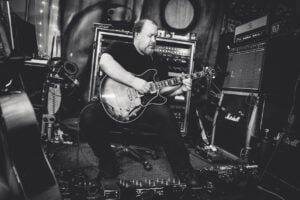
Feature Photo: Sterling Munksgard / Shutterstock.com
When a legendary psychedelic rock band found themselves in court fighting over their own name, nobody could have predicted the result would be one of the most commercially successful arena rock acts of the 1980s. Born from a legal dispute that forced the surviving members of Jefferson Starship to abandon any connection to their “Jefferson” and “Airplane” heritage, Starship emerged in 1985 as a streamlined pop-rock powerhouse that would achieve something their predecessors never could: three number-one hits on the Billboard Hot 100. This transformation from countercultural pioneers to MTV darlings represents one of rock’s most dramatic reinventions.
Starship was formed in 1985 when the remaining members of Jefferson Starship were forced to drop the “Jefferson” name following Paul Kantner’s departure and subsequent lawsuit. Formed as a successor to Jefferson Starship, the group originally featured vocalists Mickey Thomas and Grace Slick, guitarist Craig Chaquico, bassist Pete Sears, drummer Donny Baldwin and keyboardist David Freiberg. Their 1985 album Knee Deep in the Hoopla was certified platinum by the RIAA, and included two singles that went to number one on the US Billboard Hot 100 chart: “We Built This City” and “Sara”. The band achieved remarkable commercial success with their follow-up album No Protection (1987), which featured their third number-one single “Nothing’s Gonna Stop Us Now.”
The band’s history is marked by a series of departures that would eventually leave Mickey Thomas as the sole remaining connection to their peak years. Slick left Starship in February 1988, going on to join the reformed Jefferson Airplane for an album and tour in 1989, before retiring from music. Following various lineup changes and a brief hiatus, In early 1992, Thomas obtained the usage rights to the name and revived Starship as “Mickey Thomas’s Starship” before changing the billing name to “Starship featuring Mickey Thomas”, and has toured steadily ever since. This iteration of the band continues to perform the classic hits while introducing new material, maintaining the Starship legacy well into the 21st century.
Grace Slick
Grace Slick served as Starship’s co-lead vocalist from the band’s formation in 1985 until her departure in February 1988, bringing three decades of rock history and one of the most recognizable voices in popular music to the group. Grace Slick (born October 30, 1939, Highland Park, Illinois, U.S.) is an American musician and artist best known as the colead vocalist of the classic rock band Jefferson Airplane and its spinoff bands, Jefferson Starship and Starship. Her journey to Starship represented the final chapter of a remarkable career that began with Jefferson Airplane in the 1960s counterculture movement.
Slick’s tenure with Starship produced some of the band’s biggest commercial successes, though she often expressed ambivalence about the music. During the 1980s, while Slick was the only member remaining from Jefferson Airplane in Starship, the band went on to score three chart-topping successes with “We Built This City”, “Sara”, and “Nothing’s Gonna Stop Us Now”. Despite the success, Slick since has spoken negatively about the experience and the music. Her performance on “Nothing’s Gonna Stop Us Now” made history when At that time, the song made Slick the oldest female vocalist to sing on a number-one Billboard Hot 100 hit, at the age of 47.
Her departure from Starship was driven by both personal philosophy and artistic differences. During a 1998 interview with VH1 on a Behind the Music documentary featuring Jefferson Airplane, Slick, who was never shy about discussing the process of getting old, said that the main reason she retired from the music business was that “all rock-and-rollers over the age of 50 look stupid and should retire.” As Kantner, Sears and Freiberg had left the band, all the new and remaining members were more than a decade younger than she was. Slick has been quoted as saying that “old people don’t belong on a rock and roll stage”. Following her departure from Starship, She left Starship in 1988, shortly after the release of No Protection. In 1989, Slick and her former Jefferson Airplane band members reformed the group for a final reunion before her retirement from music in 1990.
Mickey Thomas
Mickey Thomas has served as Starship’s primary lead vocalist since joining Jefferson Starship in 1979, becoming the voice of the band’s biggest hits and the sole remaining link to their commercial peak. John Michael Thomas (born December 3, 1949) is an American rock singer. He is best known as one of the lead vocalists of Jefferson Starship and Starship. His distinctive high tenor voice became synonymous with the band’s evolution from progressive rock toward mainstream arena rock success.
Thomas’s path to Starship began with significant achievements outside the Jefferson family of bands. Prior to joining Jefferson Starship, he was a member of Elvin Bishop’s band as a backing and occasional lead vocalist. He was the lead singer on Bishop’s best-known song, “Fooled Around And Fell In Love.” Mickey made his mark in 1976 as lead vocalist on the mega-hit “Fooled Around And Fell In Love” with The Elvin Bishop Band. This success led to his recruitment by Jefferson Starship in 1979, following the departures of Grace Slick and Marty Balin.
Thomas became the driving force behind Starship’s commercial transformation and their greatest successes. In 1979, Mickey joined Jefferson Starship as the lead vocalist, after the departure of Grace Slick and Marty Balin, and recorded a string of hits including “Jane”, “No Way Out”, “Find Your Way Back”, “Stranger”, and “Layin It On The Line”. The group was renamed Starship in 1985 and went on to record three #1 hit songs including “We Built This City”, “Sara”, and “Nothing’s Gonna Stop Us Now”, from the film Mannequin which also was an Academy Award nominee. Thomas is the only member to be on all four Starship releases, demonstrating his central role in the band’s identity.
Despite facing significant challenges, including a violent altercation with drummer Donny Baldwin in 1989 that required facial reconstruction surgery, Thomas persevered to maintain the Starship legacy. In early 1992, Mickey Thomas revived Starship as Starship featuring Mickey Thomas and touring has continued with this title. His commitment to the band’s legacy has been unwavering, with the current incarnation continuing to tour extensively and occasionally releasing new material, including their 2013 album Loveless Fascination.
Craig Chaquico
Craig Chaquico served as Starship’s lead guitarist from the band’s formation until 1990, providing the instrumental foundation for their biggest hits while serving as the only member to appear on every Jefferson Starship and Starship recording. Craig Clinton Chaquico (or Chaquiço, /tʃəˈkiːsoʊ/ chə-KEE-soh; born September 26, 1954) is an American guitarist, songwriter, and composer. From 1974 to 1990 he was lead guitarist for the rock bands Jefferson Starship and Starship. His guitar work defined the sound of both bands throughout their most successful periods.
Chaquico’s journey with the Jefferson family of bands began at an remarkably young age, demonstrating prodigious talent that caught the attention of established rock stars. Chaquico began performing in clubs in his teens. His English teacher Jack Traylor asked him to join the band Steelwind, which performed in Sacramento and San Francisco Bay, and Traylor introduced him to Paul Kantner of Jefferson Airplane. At 16 he recorded for the first time with Kantner and Grace Slick on their albums Sunfighter and Baron von Tollbooth & the Chrome Nun. This early exposure to major recording sessions prepared him for his future role as a cornerstone of Jefferson Starship and later Starship.
His contributions to Starship’s sound cannot be overstated, as he was instrumental in crafting their signature guitar-driven approach. Starship recorded hits such as “We Built This City”, “Sara”, and “Nothing’s Gonna Stop Us Now”. Chaquico and Starship appeared on MTV videos on a regular basis and performed at the first MTV Spring Break special in Daytona Beach in 1986. Only original founding member, lead guitar player/hit songwriter on every one of the Jefferson Starship and Starship albums, concerts and videos throughout the ’70s and ’80s. His guitar work provided the melodic and rhythmic backbone for the band’s transition from progressive rock to mainstream pop-rock success.
Following his departure from Starship in 1990, Chaquico reinvented himself as a solo artist with remarkable success. Chaquico left Starship in 1990. Having become disappointed with the direction Starship was going, Chaquico formed Big Bad Wolf and recorded one album in that band. He began a solo career that explored world music, new age, and contemporary jazz. Nominated for a Grammy in 1994 for Best New Age Album, Acoustic Planet, Craig Chaquico was instrumental in making the Jefferson Starship and Starship bands one of the most successful bands in history, with more than 20 gold and platinum albums. His transformation from rock guitarist to Grammy-nominated jazz artist demonstrates his versatility and enduring musical relevance.
Pete Sears
Pete Sears served as Starship’s bassist and keyboardist from the band’s formation until early 1987, contributing to their initial commercial breakthrough before departing due to creative differences. British veteran Pete Sears, who had worked on Slick’s solo album, Manhole, and played with Rod Stewart, was selected to replace Peter Kaukonen as the band’s bass player during Jefferson Starship’s early formation. His international experience and multi-instrumental abilities made him a valuable asset to the band’s evolving sound.
Sears played a crucial role in Starship’s early success, contributing to the album that established their commercial viability. By the time the 1987 sessions for the album No Protection began, bassist Pete Sears had left the band. His departure came during the recording of what would become one of Starship’s most successful periods, indicating his discomfort with the band’s increasingly commercial direction. The directions we were taking weren’t really compatible with the kind of music that Pete wanted to play,” Thomas told the Orlando Sentinel in 1987.
His departure from Starship marked a significant shift in the band’s approach and foreshadowed future changes. Sears went on to play keyboards with former Jefferson Airplane members Jorma Kaukonen and Jack Casady in Hot Tuna for ten years, returning to the more blues-oriented and rootsy music that aligned with his artistic preferences. Despite leaving before Starship’s peak commercial period, Sears had helped establish the musical foundation that would support their subsequent success. A series of fill-in players took over on the rest of 1987’s No Protection, including co-producer Peter Wolf, but Sears’ early contributions remained integral to the band’s developing identity.
Donny Baldwin
Donny Baldwin served as Starship’s drummer throughout their most successful period, from their formation until a violent incident in 1989 that ended both his tenure and effectively concluded the original Starship era. One of Thomas’s former band mates in the Elvin Bishop Group joined Mickey as the drummer in Jefferson Airplane. Latter, Donny Baldwin became Starship’s new drummer. His rhythm section work provided the foundation for Starship’s biggest hits and their transition to a more mainstream rock sound.
Baldwin’s drumming was essential to Starship’s commercial success, appearing on all their major hits and albums. The 1989 “Love Among the Cannibals” tour was postponed after Baldwin attacked Thomas in a bar. The damage was such that it required facial reconstruction surgery. This shocking incident occurred On September 24, 1989, while the band was in Scranton, Pennsylvania for a show, Baldwin and Thomas got into a violent altercation during which Thomas suffered severe facial injuries that required extensive reconstructive surgery.
The aftermath of this incident effectively ended the classic Starship lineup and marked a turning point in the band’s history. Baldwin resigned after the incident. Starship was let go by their record label RCA and became inactive in 1991. The loss of Baldwin, combined with the departure of other key members, left Mickey Thomas to rebuild the band from scratch. Despite the unfortunate end to his tenure, Baldwin’s contributions during Starship’s peak years remain an integral part of their musical legacy, and his drumming can be heard on their most enduring hits.
David Freiberg
David Freiberg briefly served as Starship’s keyboardist during the band’s formation period, representing a connection to the Jefferson Airplane legacy before departing due to the band’s musical direction. Formed as a successor to Jefferson Starship, the group originally featured vocalists Mickey Thomas and Grace Slick, guitarist Craig Chaquico, bassist Pete Sears, drummer Donny Baldwin and keyboardist David Freiberg. As a founding member of Jefferson Airplane and veteran of the San Francisco music scene, Freiberg brought considerable experience and credibility to the newly formed Starship.
However, Freiberg’s time with Starship was short-lived due to fundamental disagreements about the band’s musical direction. Freiberg left shortly after the group’s formation, however, due to the dominance of keyboards in the band’s sound. This departure was somewhat ironic, given that Freiberg was himself a keyboardist, but it reflected the band’s shift toward a more synthesizer-heavy, commercial pop sound that differed from his preferred musical approach.
Freiberg’s departure was one of the first indicators of the creative tensions that would define Starship’s evolution. David Freiberg was dismissed from the band shortly after the lawsuit was settled, referring to the legal resolution that allowed the band to use the Starship name. His exit removed another link to the Jefferson Airplane era and signaled Starship’s commitment to moving in a more commercially oriented direction. Despite his brief tenure, Freiberg’s involvement helped legitimize Starship’s formation and provided continuity during their transition from Jefferson Starship to their new identity.
Mark Morgan
Mark Morgan served as Starship’s keyboardist during their later period, joining the band after Grace Slick’s departure as they attempted to maintain their momentum with a restructured lineup. The revamped Starship lineup, featuring Mark Morgan (keyboards) and Brett Bloomfield (bass), released ‘Love Among the Cannibals’ in 1989. His addition came during a critical period when the band was losing key members and struggling to maintain their commercial success.
Morgan’s tenure with Starship coincided with the band’s declining commercial fortunes and internal strife. Finding their commercial prospects waning, the group finally disbanded the following year. His time with the band was marked by the challenge of replacing the star power and musical chemistry of departed members like Grace Slick, while also dealing with the aftermath of the violent incident between Mickey Thomas and Donny Baldwin.
Despite the challenges facing the band during his tenure, Morgan contributed to Starship’s attempt to continue their recording and touring activities. The Love Among the Cannibals album represented the band’s effort to prove they could continue as a viable commercial entity without some of their most recognizable members. However, the combination of reduced radio play, internal conflicts, and a changing musical landscape ultimately led to the band’s temporary dissolution, marking the end of Morgan’s time with Starship and the conclusion of their original run as a major commercial force.
Brett Bloomfield
Brett Bloomfield served multiple tenures as Starship’s bassist, first joining during the band’s transitional period in the late 1980s and later returning during Mickey Thomas’s revival of the group in the 1990s. The revamped Starship lineup, featuring Mark Morgan (keyboards) and Brett Bloomfield (bass), released ‘Love Among the Cannibals’ in 1989. His initial involvement came during a challenging period when the band was restructuring following the departure of several key members.
Bloomfield demonstrated loyalty to the Starship legacy by returning when Mickey Thomas reformed the band in the early 1990s. Although Thomas was touring with mostly new band members, bassist Brett Bloomfield returned to Starship for several years, from 1993 to 1997. This return tenure showed his commitment to the band’s continuation and provided musical continuity during a period when Thomas was rebuilding the group with largely new personnel.
His dual tenure with Starship spans two distinct eras of the band’s history, from their commercial peak’s aftermath to their revival as a touring entity. Bloomfield’s contributions helped bridge the gap between the original Starship’s dissolution and their reemergence as “Starship featuring Mickey Thomas.” His bass playing provided the rhythmic foundation for both the band’s final original-lineup album and their subsequent touring incarnation, making him one of the few musicians to serve the band during both their decline and resurrection phases.
Current Touring Members
The current incarnation of Starship, officially known as “Starship featuring Mickey Thomas,” represents Mickey Thomas’s dedication to preserving the band’s legacy while introducing new musical elements to their classic repertoire. In early 1992, Thomas obtained the usage rights to the name and revived Starship as “Mickey Thomas’s Starship” before changing the billing name to “Starship featuring Mickey Thomas”, and has toured steadily ever since. This iteration has maintained an active touring schedule for over three decades, demonstrating remarkable longevity in an industry known for frequent lineup changes.
The modern lineup reflects Thomas’s commitment to both honoring the band’s classic sound and incorporating fresh musical perspectives. Besides Thomas, the new lineup featured: Melisa Kary (vocals), Jeff Tamelier (guitar), Bobby Vega (bass), T. Moran (drums), John Lee Sanders (keyboards, saxophone), Max Haskett (trumpet, backing vocals) and Bill Slais (saxophone, keyboards). Female vocalist Stephanie Calvert joined the band in 2006, adding another layer to the band’s vocal harmonies and helping to fill the void left by Grace Slick’s departure years earlier.
The current Starship continues to evolve while maintaining their connection to the classic hits that defined their success. The band released the non-album single “Get Out Again” in 2007, and their first new studio album of original music in over two decades, Loveless Fascination, produced by Jeff Pilson of Foreigner and Dokken, was released on September 17, 2013. Thomas still has his soaring voice and to describe the band in one word would be explosive, according to recent concert reviews. Their setlist typically includes not only Starship classics but also material from Jefferson Starship, Jefferson Airplane, and even Thomas’s work with Elvin Bishop, providing audiences with a comprehensive journey through several decades of rock history.
Melisa Kary
Melisa Kary has served as a vocalist with various incarnations of Starship since the late 1980s, representing one of the longest-tenured members of the band’s modern era. The band went on another tour to support the album; recruiting backing singers Christina Marie Saxton and Melisa Kary to fill the gap left by Slick’s departure. Her initial involvement with the band came during a critical transition period when Starship was attempting to continue without Grace Slick’s iconic voice.
Kary’s commitment to the Starship legacy was demonstrated by her return to the band during its revival period. Besides Thomas, the new lineup featured: Melisa Kary (vocals), Jeff Tamelier (guitar), Bobby Vega (bass), T. Moran (drums), John Lee Sanders (keyboards, saxophone), Max Haskett (trumpet, backing vocals) and Bill Slais (saxophone, keyboards). Melisa Kary and Christina Marie Saxton, who had both performed with the group as backing singers on tour in 1989 through 1990, also had stints as official members in the revived band.
Her vocal contributions have been essential to maintaining the harmonic complexity that characterized Starship’s biggest hits. Kary’s ability to handle both lead and backing vocal duties has provided Mickey Thomas with the vocal support necessary to recreate the layered sound of classic Starship recordings in a live setting. Her tenure with the band spans multiple decades and various lineup configurations, making her one of the most consistent elements in Starship’s evolution since their original commercial peak, and her presence has helped maintain the vocal depth that fans associate with the band’s classic material.
Stephanie Calvert
Stephanie Calvert joined Starship in 2006 as a female vocalist, bringing fresh energy to the band’s sound while helping to recreate the vocal dynamics that characterized their most successful period. Female vocalist Stephanie Calvert joined the band in 2006. Her addition addressed the long-standing absence of a prominent female voice in the band’s lineup, a void that had existed since Grace Slick’s departure in 1988.
Calvert’s role in the band extends beyond simply filling a vocal position, as she has become integral to the modern Starship’s ability to perform their classic repertoire authentically. The setlist included songs from not only Starship but Jefferson Starship, Jefferson Airplane, and Elvin Bishop. Thomas also performed Jefferson Starship’s number one hit “Jane” which he sang the original lead vocals for as well as Elvin Bishop’s “Fooled Around and Fell in Love” which he also sang on the original recording. They also played homage to Jefferson Airplane plane with a medley of “White Rabbit,” “Miracles,” “Count on Me,” and “Somebody to Love.” Thomas still has his soaring voice and to describe the band in one word would be explosive. From beginning to end there was a lot of energy on that stage and Coey sings Slick’s vocals incredibly.
Her contributions have helped the current Starship maintain the vocal complexity and gender dynamics that were crucial to their original success. Calvert’s presence allows the band to perform classics like “White Rabbit” and “Somebody to Love” with authenticity while also contributing to any new material the band creates. Her integration into the lineup represents the band’s commitment to honoring their musical heritage while adapting to contemporary touring realities, and her vocal abilities have earned praise from both fans and critics who appreciate her respectful approach to interpreting Grace Slick’s iconic parts.
Check out more Starship articles on ClassicRockHistory.com Just click on any of the links below……
Complete List Of Jefferson Starship Band Members
Complete List Of Jefferson Airplane Band Members
Top 10 Jefferson Airplane Songs
Top 10 Jefferson Starship Songs
Complete List Of Jefferson Starship Albums And Discography
Complete List Of Jefferson Airplane Albums And Discography
Read More: Artists’ Interviews Directory At ClassicRockHistory.com
Read More: Classic Rock Bands List And Directory


